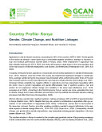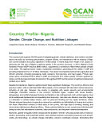Nature-Positive Solutions Initiative baseline evaluation survey report: India
Geoffrey, Baragu · Azzarri, Carlo · Boukaka, Sedi-Anne · de Falcis, Eleonora · Ferguson, Nathaniel
Mär 2025 · Intl Food Policy Res Inst
E-Book
33
Seiten
family_home
Zulässig
info
reportBewertungen und Rezensionen werden nicht geprüft Weitere Informationen
Über dieses E-Book
The pressing need to achieve sustainable agriculture and mitigate climate change has led to a growing recognition of the importance of nature-based solutions (NBS). Defined as interventions that leverage the protective, restorative, and regulatory functions of ecosystems (Cohen-Shacham et al., 2016), NBS offers a holistic approach to addressing a range of environmental and societal challenges. This framework positions humans as active stewards of ecosystems rather than passive beneficiaries. Industrial agriculture, in prioritizing mass-scale food production, has exacted a heavy toll on both the environment and human well-being. Miralles-Wilhelm and Iseman (2021) report that 52 percent of global agricultural lands suffer from moderate to severe degradation due to unsustainable practices, contributing to 25 percent of global greenhouse gas emissions. Moreover, industrial agriculture drives 80 percent of deforestation, threatens 86 percent of the 28,000 species currently at risk of extinction (through habitat conversion and pollution), and accelerates soil and water degradation. The use of chemical inputs, monocropping, and poor waste management further compromise nutrition, reduce crop resilience, and depress farming incomes. These challenges highlight the urgent need to transition toward resilient, nature positive agricultural systems capable of sustaining smallholder farmers and ensuring that agriculture becomes a net contributor to environmental restoration. In response, the One CGIAR initiative, "Nature-positive solutions for shifting agri-food systems to more resilient and sustainable pathways" (NATURE+), seeks to enhance the adoption of nature-positive solutions (NPS) to promote sustainable agricultural productivity. NATURE+ addresses key systemic barriers in three areas: (1) land degradation and resource depletion, (2) limited evidence and knowledge gaps within the agricultural research for development (AR4D) community, and (3) the lack of viable business models to drive public-private partnerships in sustainable agriculture. While the harmful impacts of industrial agriculture are well documented, the AR4D community lacks robust evidence and tailored tools to support NPS planning. The 2021 UN Food Systems Summit and the COVID-19 pandemic have further underscored the need for systemic transformation. The 2020 World Economic Forum report, "The Future of Nature and Business," estimates that NPS could create 395 million jobs by 2030, but achieving this potential requires substantial investment in evidence-based innovation and decision-support tools for biodiversity enhancement, soil management, waste management, and water conservation.
Dieses E-Book bewerten
Deine Meinung ist gefragt!
Informationen zum Lesen
Smartphones und Tablets
Nachdem du die Google Play Bücher App für Android und iPad/iPhone installiert hast, wird diese automatisch mit deinem Konto synchronisiert, sodass du auch unterwegs online und offline lesen kannst.
Laptops und Computer
Im Webbrowser auf deinem Computer kannst du dir Hörbucher anhören, die du bei Google Play gekauft hast.
E-Reader und andere Geräte
Wenn du Bücher auf E-Ink-Geräten lesen möchtest, beispielsweise auf einem Kobo eReader, lade eine Datei herunter und übertrage sie auf dein Gerät. Eine ausführliche Anleitung zum Übertragen der Dateien auf unterstützte E-Reader findest du in der Hilfe.








